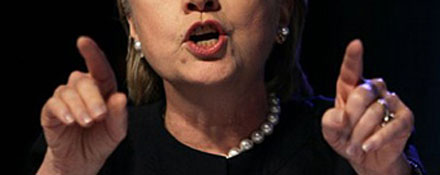The Obliterator
by Mostafa Rahbar
22-May-2008
A while ago, the Hilarious Hillary “ate sugar” and threatened to obliterate Iran, the land that has given so much to the world. These contributions along with other images began to haunt my distressed head in seemingly endless spurts. I remembered the day when my friend Ali was driving me around in New York City and I had stopped him in front of the biggest post office in the world to proudly photograph the words of Cyrus the Great that adorns the building: “Neither snow, nor rain, nor gloom of night stays these couriers from the swift completion of their appointed rounds.” I remembered the words of the literary giants of the United States such as Herman Melville, the creator of one of the most magnificent masterpieces, Moby Dick, which has been shining on the crest of the English literature. I remembered how he had clearly stated with unparalleled reverence that he was inspired by Persian literature in the creation of his works. I remembered another prominent literary figure, Ralph Waldo Emerson and his 175-verse poem in praise of Saadi. Here is a segment:
Many may come,
But one shall sing;
Two touch the string,
The harp is dumb.
Though there come a million,
Wise Saadi dwells alone.
Yet Saadi loves the race of men,-
No churl, immured in cave or den;
In bower and hall
He wants them all,
Nor can dispense
With Persia for his audience;
They must give ear,
Grow red with joy and white with fear;
But he has no companion;
Come ten, or come a million,
Good Saadi dwells alone.
It was Emerson, according to an article in enotes.com, “who influenced such acclaimed writers as Walt Whitman, Nathaniel Hawthorn, Henry David Thoreau, Herman Melville, Emily Dickinson, Edwin Arlington Robinson, and Robert Frost.”—all literary prides of the English-speaking world.
In an article, Professor Richard J. Newman writes, “Reading John D. Yohannan’s book, Persian poetry in England and America: A 200-year History, I was surprised to learn how many of the writers I’d studied in college had been influenced by Persian literature, and by Saadi specifically, among them Longfellow, Tennyson and Byron—who called Saadi a Persian Catullus—and Melville, Thoreau and Ralph Waldo Emerson, who referred to the Gulistan as a secular bible. Emerson not only wrote a poem called “Saadi,” but he also provided the preface to the 1865 edition of Francis Gladwin’s 1806 translation, the first complete translation of the text to appear in English.”
I could go on and talk about Guthe, the great German writer , who adored Hafez and considered him the sole source of inspiration for his works. One could write volumes about Khawrazmi and Omar Khayyam, two of the greatest mathematicians in the history of mankind and about Ibn Sina, known as Avicenna in the West, whom Westerners refer to as “the father of modern medicine,” and whose books were the standard medical textbooks in Europe until the 18th century.
Above all, I remembered the innocent faces of our little nephews and nieces with a sparkle in their eyes and a shy smile on their faces. I remembered our brothers and sisters, our fathers and mothers, our grandfathers and our grandmothers, who in their last days are living with a burning desire in their hearts to see us one more time, kiss us a thousand times, embrace us, and never let us go. And for some, this flickering hope gets dimmer and dimmer until it dies with them. I remembered the calloused hands and the sunburned faces of the honorable farmers who toil in the wheat fields and the rice paddies of that splendid land from dawn to dusk.
I remembered the misty forests of Gilan and Mazandaran, the beloved blue Esfahan, the fire temples of Yazd and Kerman, the etherial mausoleums of Hafez , Saadi, Khayyam, and Attar. I remembered the snow-capped Alborz mountains, the indomitable Damavand, who has guarded the legend of Simorgh since time immemorial and has cradled his beloved Anahita in his warm, loving arms. I remembered the majestic Sahand and Sabalan, the home of the invincible spirit of Babak. I remembered the grand Zagros. I remembered……..
I remembered and I wrote the following:
The obliteratorWatch out!
Here I come!
The Terminator!
The Exterminator!
The Obliterator!
Genghiz Khan incarnate!
I will smoke you out
You filthy little cockroaches!
You stinking rats!
You insignificant runts!
Don’t you dare defile our heritage
With your bogus poets, astronomers, and mathematicians
You say our literary figures were inspired
By those rag-heads and sand niggers?
How dare you?
How dare you pontificate?
Those who gave undeserved praises to your so-called wise men
Were opium heads and junkies themselves!
Yes, I do mean Melville and Emerson
Yes, I am talking about Hawthorn and Walt Whitman
I do mean all of them
They were junkies and hoodlums themselves
They can shove their deliriums up their asses
How I wish I had lived then
And exterminated all of them too!
What a stigma these despicable men were!
What a disgrace!
You say the words of your imbecile king is scribbled on our post office building
When I become president
I will have the post office razed to the ground
And have the rubble hauled to Eyeran
Every brick and stone.
I will scorch your squalid land
Watch out!
Here I come!
The Terminator!
The Exterminator!
The Obliterator!


